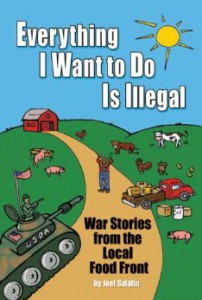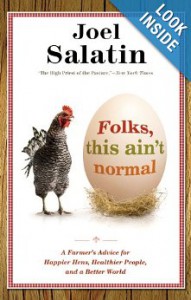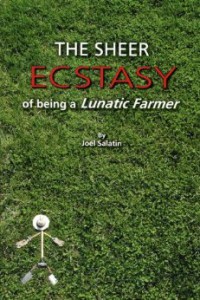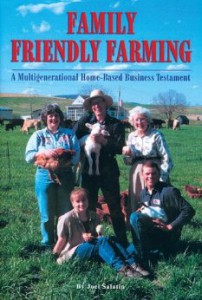
Drawing upon 40 years' experience as an ecological farmer and marketer, Joel Salatin explains with humor and passion why Americans do not have the freedom to choose the food they purchase and eat. From child labor regulations to food inspection, bureaucrats provide themselves sole discretion over what food is available in the local marketplace. Their system favors industrial, global corporate food systems and discourages community-based food commerce, resulting in homogenized selection, mediocre quality, and exposure to non-organic farming practices. Salatin's expert insight explains why local food is expensive and difficult to find and will illuminate for the reader a deeper understanding of the industrial food complex.

From farmer Joel Salatin's point of view, life in the 21st century just ain't normal. In FOLKS, THIS AIN'T NORMAL, he discusses how far removed we are from the simple, sustainable joy that comes from living close to the land and the people we love. Salatin has many thoughts on what normal is and shares practical and philosophical ideas for changing our lives in small ways that have big impact. Salatin, hailed by the New York Times as “Virginia's most multifaceted agrarian since Thomas Jefferson [and] the high priest of the pasture” and profiled in the Academy Award nominated documentary Food, Inc. and the bestselling book The Omnivore's Dilemma, understands what food should be: Wholesome, seasonal, raised naturally, procured locally, prepared lovingly, and eaten with a profound reverence for the circle of life. And his message doesn't stop there. From child-rearing, to creating quality family time, to respecting the environment, Salatin writes with a wicked sense of humor and true storyteller's knack for the revealing anecdote.

Foodies and environmentally minded folks often struggle to understand and articulate the fundamental differences between the farming and food systems they endorse and those promoted by Monsanto and friends. With visceral stories and humor from Salatin's half-century as a “lunatic” farmer, Salatin contrasts the differences on many levels: practical, spiritual, social, economic, ecological, political, and nutritional.
In today's conventional food-production paradigm, any farm that is open-sourced, compost-fertilized, pasture-based, portably-infrastructured, solar-driven, multi-speciated, heavily peopled, and soil-building must be operated by a lunatic. Modern, normal, reasonable farmers erect “No Trespassing” signs, deplete soil, worship annuals, apply petroleum-based chemicals, produce only one commodity, erect Concentrated Animal Feeding Operations, and discourage young people from farming.
Anyone looking for ammunition to defend a more localized, solar-driven, diversified food system will find an entire arsenal in these pages. With wit and humor honed during countless hours working on the farm he loves, and then interacting with conventional naysayers, Salatin brings the land to life, farming to sacredness, and food to ministry.
Divided into four main sections, the first deals with principles to nurture the earth, an idea mainline farming has never really endorsed. The second section describes food and fiber production, including the notion that most farmers don't care about nutrient density or taste because all they want is shipability and volume. The third section, titled “Respect for Life,” presents an apologetic for food sacredness and farming as a healing ministry. Only lunatics would want less machinery and pathogenicity. Oh, the ecstasy of not using drugs or paying bankers. How sad. The final section deals with promoting community, including the notion that more farmers would be a good thing.

Saving the landscape, rebuilding entrepreneurial rural families, and protecting nutritious food are the themes of this timeless treatise-hence the word “testament.” Delving into the soul of the Salatin family's nationally acclaimed Polyface Farm, author Joel Salatin offers Family Friendly Farming as the key to dealing with resource issues, food policy, and social fabric.
With humor and personal stories, he opens his family and farm convictions for all to see, share, and enjoy. Written from his unabashed “Christian libertarian environmentalist capitalist” perspective, his ideas are guaranteed to encourage and challenge virtually every “ism” in the culture. It will captivate anyone passionate about healing the land, healing families, and healing the food supply.
For several decades young people have been leaving the family farm. The ones left behind are now responsible for society's greatest resources: clean land and clean food. Anyone dedicated to preserving these resources will find in these pages a nongovernmental, self-empowerment approach to environmentalism and food safety.
The heart of this book is aimed toward parents tired of their Dilbert cubicle at the end of the expressway who want to reconnect with their children through a pastoral lifestyle. It's written for anyone who yearns to grow old working with and being adored by value-sharing grandchildren and honored by passionate, productive adult children. Family Friendly Farming can make any family business more viable and any family more functional.
The ten-chapter section on how to get the kids to love the farm is an invaluable addition to any collection of child-rearing manuals. Salatin moves from the family team-building section into a practical discussion on how to increase income per acre and create new, white-collar salaries without buying more land, equipment, or buildings. He deals with the unique and thorny issues surrounding any family business by using his own multi-generational family farm experience as his base for insight and wisdom.
Phi Beta Iota: We are reminded of Andrew Jackson Higgins and the Boats That Won World War II (Louisiana State University Press, 1998). A citizen entrepreneur was not only able to train the normal citizens of New Orleans to build ships down a main avenue, he was turning out one completed Liberty Ship a day, and was able to design, build, and test a landing craft — the boats that won WWII — within 24 hours. The Navy bureaucracy did everything they could to put him out of business — they would rather lose a war than admit they were incapable — precisely the prevailing attitude that prevents tranformations. The same thing is happening across the USA today, across every policy area from agriculture to defense to energy and health to water. “Toxic” has been codified — the bureaucracy means well, but it has become anathema to the public interest.



